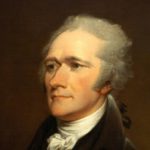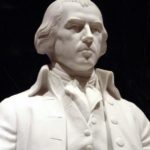While a famous committee of five drafted the Declaration of Independence, a far more unsung committee of thirteen wrote America’s first rulebook. The Articles of Confederation was our first constitution, and it lasted nine years. If you prefer Typee to Moby Dick, Blood Simple to A Serious Man, or Picasso’s Blue Period over Neoclassicism, you just might like the Articles of Confederation.
The fable of its weaknesses, strengths, rise, and downfall are told to us by Danielle Allen, Linda Monk, Joel Collins, and Lindsey Stevens.
This short episode includes a one-page Graphic Organizer for students to take notes on while listening, as well as discussion questions on the back side.
James Madison and the Constitution
In his essay “James Madison and the Constitution,” Professor Jack Rakove probes the mind of James Madison — the delegate known as the “architect of the Constitution,” explores the weaknesses of the Articles government, and develops arguments for a stronger union in a memorandum entitled Vices of the Political System of the United States. Free registration for students and teachers required to access resource.
The Federalist Debates: Balancing Power Between State and Federal Governments

This series of activities introduces students to one of the most hotly debated issues during the formation of the American government — how much power the federal government should have — or alternatively, how much liberty states and citizens should have.
By tracing the U.S. federal system of government to its roots, established by America’s Founding Fathers in the late 18th century, student examine the controversial issue of state sovereignty versus federal power. Students compare the Articles of Confederation to the Constitution, analyzing why weaknesses in the former led to the creation of the latter. Then they examine the resulting system of government formed by the Constitution.
James Madison in the 1790s

This short video examines the “Madison problem”: Did the nationalist of the 1780s become an ardent supporter of strong states in the 1790s? Professor Jack Rakove explains that Madison consistently sought to balance the powers of the states and the federal government. In the 1780s, the weak government under the Articles needed to be strengthened by the Constitution while in the 1790s, the strong government under the Federalists needed to be checked by the states asserting their powers.